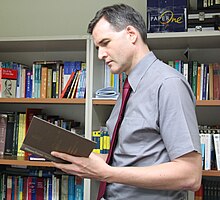| This article has an unclear citation style. The references used may be made clearer with a different or consistent style of citation and footnoting. (August 2024) (Learn how and when to remove this message) |
| Alexander Argüelles | |
|---|---|
 Argüelles in 2011 Argüelles in 2011 | |
| Born | (1964-04-30) 30 April 1964 (age 60) Chicago, Illinois, U.S. |
| Spouse | Park Hyun-Kyung |
| Children | 2 |
| Academic background | |
| Education |
|
| Thesis | Viking Dreams: Mythological and Religious Dream Symbolism in the Old Norse Sagas (1994) |
| Doctoral advisor | Wendy Doniger |
| Other advisors | Ioan P. Culianu |
| Academic work | |
| Discipline | Linguist |
| Institutions |
|
| Main interests | |
| Website | alexanderarguelles.com |
Alexander Sabino Argüelles (born 30 April 1964) is an American linguist notable for his work on the Korean language. An avid language learner, he was profiled in Michael Erard's Babel No More. He is one of the polyglots listed in Kenneth Hyltenstam's Advanced Proficiency and Exceptional Ability in Second Languages, and has been described by The New Yorker as "a legendary figure in the community".
Argüelles is highly proficient in 10 languages: English, Spanish, French, German, Italian, Portuguese, Dutch, Catalan, Swedish and Korean, and has a knowledge of more than 60 languages.
Career
He has taught in South Korea, Lebanon, Singapore, and Dubai, and was a Group Director of Immersion Language Programs at Concordia Language Villages in Bemidji, Minnesota.
Language learning
Argüelles reportedly devotes an average of nine hours a day to language learning, though he has stated that in his twenties he spent as much as sixteen hours per day. He advocates working on multiple languages daily for shorter periods (as little as 15 minutes), working on different areas in different languages, from reading novels, to writing grammatical exercises. He sets daily goals to language learning and has recorded his daily progress in logbooks going back over 20 years.
Argüelles is highly proficient in 10 languages: English, Spanish, French, German, Italian, Portuguese, Dutch, Catalan, Swedish and Korean, and is accomplished in many more, such as Latin, Greek and Sanskrit, which he had studied by the end of college. He has studied over 60 languages to various degrees of proficiency. He stated in late 2022 that he had learning resources in his library for 155 languages.
Personal life
He is the son of the poet Ivan Argüelles and the nephew of the New Ageist José Argüelles.
Notable works
On Korean
- Argüelles, Alexander, and Jong-Rok Kim (2000). A Historical, Literary and Cultural Approach to the Korean Language. Seoul: Hollym.
- Argüelles, Alexander, and Jong-Rok Kim (2004). A Handbook of Korean Verbal Conjugation. Hyattsville, Maryland: Dunwoody Press.
- Argüelles, Alexander (2007). Korean Newspaper Reader. Hyattsville, Maryland: Dunwoody Press.
- Argüelles, Alexander (2010). North Korean Reader. Hyattsville, Maryland: Dunwoody Press.
Other works
- Argüelles, Alexander (1994). Viking Dreams: Mythological and Religious Dream Symbolism in the Old Norse Sagas. Doctoral dissertation, University of Chicago.
- Argüelles, Alexander (1999). 프랑스동사변화안내: La Conjugaison des Verbes. Seoul: 신아사.
- Argüelles, Alexander (2006). English French Spanish German Dictionary. Beirut, Lebanon: Librairie du Liban.
Notes
- The original Spanish pronunciation of Argüelles is [aɾˈɣweʎes].
References
- 'Wendy Doniger: Curriculum Vitae'.
- Anton, Ted (1992). 'The Killing of Professor Culianu'. Lingua Franca, Vol. 2, No. 6.
- Dr. Alexander Arguelles: Associate Professor, Member of Committee (Promotion - Planning & Accreditation).
- Dr. Alexander Arguelles: Associate Professor, College of Education.
- ^ Lim Yan Liang (2012). 'One man, 50 languages'. The Sunday Times (Singapore), 1 April.
- Erard, Michael (2012). Babel No More: The Search for the World's Most Extraordinary Language Learners. New York: Free Press.
- Hyltenstam, Kenneth (ed.) (2016). Advanced Proficiency and Exceptional Ability in Second Languages. Berlin: De Gruyter Mouton.
- Thurman, Judith (2018). 'Maltese for Beginners'. The New Yorker, 3 September. (Published online as 'The Mystery of People Who Speak Dozens of Languages'.)
- LinkedIn.
- "How Many Languages is it Possible to Know?". Mentalfloss.com. 27 February 2013. Retrieved 10 September 2020.
- "A Polyglot's Daily Linguistic Workout". Youtube. 10 July 2009. Retrieved 10 September 2020.
- "I could speak a different language every week for a year". New Scientist. 25 January 2017. Retrieved 10 September 2020.
- "The World's Largest Language Library: 155 Languages". ProfASAr. 1 January 2023. Retrieved 30 June 2023.
External links
Interviews
- August 2006
- July 2008
- July 2009
- December 2010
- January 2012
- March 2012
- April 2012
- June 2012
- February 2014
- January 2017
- September 2017
Other links
Categories:- 1964 births
- 21st-century lexicographers
- American academics of Mexican descent
- American expatriates in Germany
- American expatriates in Lebanon
- American expatriates in Singapore
- American expatriates in South Korea
- American expatriates in the United Arab Emirates
- American lexicographers
- American orientalists
- American philologists
- Columbia University alumni
- American Koreanists
- Linguists from the United States
- Living people
- People from Chicago
- University of Chicago alumni
- Linguists of Korean